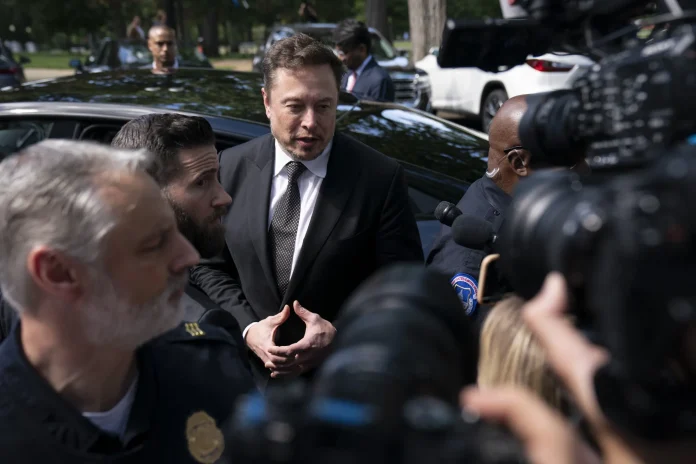Elon Musk took his support for Germany’s right party (AfD) to a new level on Thursday by having a live chat with its leader Alice Weidel.
Musk and Alice Weidel’s virtual meeting on Thursday came amid growing criticism of the US billionaire over his active support for far-right parties opposed to the liberal establishment across Europe and accusations of interfering in Germany’s February 23 election campaign.
In the talk, Musk showered praise on the anti-immigrant AfD, which is second in opinion polls in Germany with 21.5 per cent, behind only the conservative CDU/CSU bloc.
The nearly 75-minute conversation covered everything from energy policy and education to their joint desire to cut German bureaucracy and prevent illegal immigration. Douglas Adams, Schopenhauer, the meaning of life, whether Adolf Hitler was a socialist or a far-right extremist, and how to resolve the Israeli-Palestinian conflict were also discussed.
Agree on everything
Musk and Weidel seemed to agree on everything, including the need to end hostilities in Ukraine, with Musk stating, “President Trump is going to solve this conflict very quickly.”
When asked”‘by what measures” that might happen, Musk seemed a little flustered. “To be clear, it’s up to President Trump. He is the commander-in-chief … I don’t want to speak for him …. But it does require strong leadership in the States.”
Asked by Weidel when he might be “ready to send human expeditions to Mars,” Elon Musk said he plans to send uncrewed spacecraft to the planet in about two years and crewed spacecraft in about four.
The billionaire said his goal was for “Martians” to be able to rescue Earthlings “in case of emergency … just as America saved Europe during World War II.”
Weidel ended the conversation after Musk outlined his life philosophy (“the question is more important than the answer”) with the help of Douglas Adams and told her about his teenage disagreements with Schopenhauer.
Musk on German politics
Musk has regularly commented on German politics since last month, when he backed the AfD, which has been classified as right-wing extremist by German intelligence. He called President Frank-Walter Steinmeier a “tyrant” for criticising the AfD and said Chancellor Olaf Scholz should resign after the terrorist attack at a Christmas market in Magdeburg that killed six people.
Last week, Elon Musk published an article in the Welt am Sonntag newspaper in which he justified the AfD’s policies and said it was wrong to call the party extreme right-wing.
Weidel and other party leaders seemed emboldened after Trump won the US election in November. Musk’s support for the party appears to have further strengthened the AfD, analysts say, and could boost its popularity among the German electorate.
Discussing the Digital Services Act
Ahead of Thursday’s speech at XSpace, the European Commission said it would scrutinise whether the debate could lead to a breach of the Digital Services Act (DSA). A spokesperson for the DSA said it had no objection to the discussion per se, rather its interest lies in the suggestion that platform X is showing a predilection for certain types of topics.
A pressure group called LobbyControl, which favours greater transparency in European politics, said it was specifically looking into whether the debate had breached German campaign finance laws, suggesting it could be seen as political advertising.
Heightened tensions over Musk’s recent alleged meddling in German politics have prompted Germany’s lower house of parliament to investigate whether the digital discussion could be considered illegal.
A spokesman for Weidel denied the allegations, saying the speech did not amount to an illegal donation to the party, but was held as a legitimate expression of free speech that was not staged.
Germany’s Federal Network Agency said it would monitor whether any algorithms on the platform were manipulated before, during or after the debate and would pass any relevant information to the DSA.
